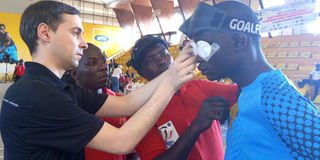Uganda solicit funds to nurture goalball talent

Guarded. Alexey Balyaev (L), IBSA sporting director in charge of goalball, decorating Uganda’s Buni ahead of the final with Kenya at Lugogo. PHOTOS BY ABDUL-NASSER SSEMUGABI
Uganda recently hosted the first-ever East African Goalball Championship at the MTN Arena-Lugogo.
Ugandan ladies beat Kenyans 10-0 to lift the women’s trophy; Kenya revenged by thumping Uganda 20-10 in the men’s final.
Rwanda, Burundi, South Sudan and Tanzania also graced the four-day event that begun with a training course for umpires and coaches, courtesy of International Blind Sport Association (IBSA), which also provided each team with balls, eyeshades, education equipment, some of which they can use in the future.
Alexey Baryaev, IBSA goalball sporting director, praised Uganda’s talent and advised on how the sport can be developed.
“Uganda has a really good team,” he said. “They have won the female tournament and the made the final of the male tournament. But they don’t have funds to go to the African championship.”
Specifically, “They are throwing fast, they can understand the game. When you are playing in darkness, you have to feel your teammates, understand the orientation, points of the field of play, they do all this.”
Last year, IBSA took the same event to Ivory Coast, for West African countries. Today, Ivory Coast is progressing, organising regular national championships and participating in this year’s African championship in Egypt.
Baryaev, however, decried Africa’s poor transport system that makes teams’ travels very hard and expensive as the major reason why other Ivory Coast’s neighbours like Benin, Cameroon, Ghana, Mali, Mauritius, Niger, haven’t followed suit.
Practice is key
In Uganda goalball is mostly played on grass pitches or earth. Baryaev said Ugandans can do even better if they train on wooden floors used on the international scene.
Even the Lugogo (cement) floor is risky - it can injure your knees or elbows when you dive, “but we prefer that teams train as much as possible,” he said.
However, when playing on a different floor, “You must change your defence style because, say, on grass, the ball won’t be so fast and you won’t use so much of your power to catch it.”
The impact
The regular practice Baryaev emphasises does not just sharpen the player’s skills; it also quickens the rehabilitation process. “Before playing goalball, many are really blind people,” he said.
“But through playing they learn to socialise. And the regular training improves their physical health.”
What officials should know
At the beginning, IBSA trainers discussed the rules with the referees and coaches. Next was the practical test.
At first, Baryaev said, it was hard for them but the more match practice they got, the better they became. “They are now almost on the same level with international referees. They understand and can control the game, and they can only improve with more game practice.
“I’m an international referee but beyond knowing the rules, practice is important to me.”
He added that the worst mistake an umpire can do, is doing something against the rules. Hence: “You have to know the rules better than anybody else, make a sharp whistle and a loud voice because the players are in darkness. So they must hear you and understand you.”
On potential chaos due to the umpire’s errors, Baryaev said: “In my experience of 10 years, I haven’t seen fighting. Some coaches can be aggressive but the referee has to be tough to avert any escalation.”
Because players wear eyeshades, they can clash with their heads, or goal posts. Knee injuries are also common but not so serious. “At least I’ve never seen any emergency car taking a player after a game.”
Russian case
Baryaev is Russian. He shared his country’s success story in goalball despite the infamous doping scandal and the subsequent ban by International Paralympic Committee (IPC).
“Goalball is very developed in Russia,” he said. “We have a national championship that pits 25 strong teams from all over Russia each year. The female national team are the European champions; they are vice world champions and they qualified for the (2016) Paralympics but the IPC suspended the Russian Paralympic Committee (for doping). But I’ve never heard any doping stories in goalball. Nevertheless, they are still training.”
The male team has not been as successful but they do not relent.
Going forward
It was no surprise Lugogo Arena was empty - Ugandans haven’t embraced disability sport - but Baryaev thinks publicity is the answer.
“Crowds come to the competition venue if you did some advertising in the media, in shopping centres, etc,” he said. “In Rio Paralympics, we had about 7,000 spectators at every game. People like the sport if you make them know about it.”
One last thing about Ugandan goalball: “I wish to see Ugandan goalball continue, I don’t want it to stop on this tournament and soon we want to see that success story unfold,” he said.
“But that will come when someone helps with the finances for teams to participate in major events like the Paralympics.”




